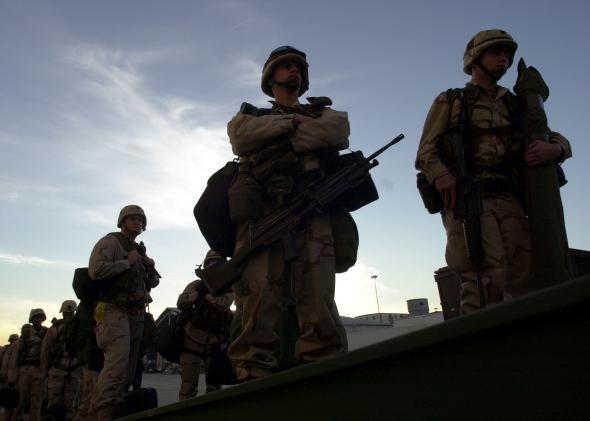This question originally appeared on Quora.
Answer by Aaron Anderson:
I have deployed to both Iraq and Afghanistan in 2003, but Iraq was my first trip into a combat zone.
My first trip to Iraq was with the original invasion in February 2003. I was serving at this time in 1/75 Ranger Battalion in Savannah, Ga. With the political buildup to the war progressing, my section knew that a deployment was coming, but we didn’t know entirely when. When we did find out, I remember standing in my building with a group of fellow soldiers. My section boss had walked in looking tense and told us we are going. If I remember correctly, this was about a two-week window from notification to deployment. I’m sure other parts of the battalion was taking off ASAP, but I was not a high priority and took off with the main element.
I remember at the time I was quite excited to hear the news. I had just left the 82nd Airborne Division and worked my way into Ranger Regiment to serve my country in a higher capacity, and I wanted that combat scroll (patch on the shoulder showing a combat tour). Additionally, I was born and raised in a very rural area near the Iowa border and never experienced anything foreign in my life. I can say that I really didn’t know anything about the war or the country I was fixing to enter. I always kept an eye on the news in the chow halls and read bits of the news to understand that WMDs and al-Qaida links were the United States’ justifications for Operation Iraq Freedom. I would be willing to say that many of my fellow soldiers were about as informed as I was. Most of us were only 19 to 22 years old at the time and didn’t care too much about the news.
I remember the work environment becoming pretty intense as many soldiers were getting the equipment and weapons in order. I still remember writing out a will and signing military documents in the event of my death overseas. I ended up taking additional classes with my chemical protective gear, which required self-injections with pretty thick-gauge needles. (That was scary.) I remember standing in an air cargo bay getting ready to ride to my plane for deployment and the medic injected the needle to show us what will happen when it stabbed into our chests in the event nuclear or biological weapons went off. Prior to my deployment and my arrival into the Middle East, I was watching the news trying to figure out what was going on. Many would be surprised to know that a lot of the soldiers were watching CNN in Kuwait, Saudi Arabia, and other neighboring states to see what was going on during the March invasion.
My next deployment was that year to Afghanistan for a few months. Like my previous deployment to Iraq, I was given about a two-week window from notification to deployment. As with my deployment to Iraq, I made the phone calls home to talk with the family and also try to convince the folks that everything was going to be OK. I shared the same emotion of excitement like my deployment to Iraq. However, with this deployment, I had a lot more confidence in the men I was working with and a bond that was much different than prior to the deployments. This is not to say I didn’t have confidence in them prior to this, but we had not all been in a real-life combat zone together. My last trip to Iraq seemed like a big sleepover out in the middle of the desert, and now I was fixing to deploy into the mountains of Afghanistan near Pakistan. I was expecting the same type of sleepover, but this time in snowy conditions and more rigorous patrolling. I actually had a pretty good time in Afghanistan in a bizarre way. I met a lot of interesting locals and had a cookout with villagers as well. The Afghans were some of the kindest people I’ve ever met.
The one event that has stuck with me since getting out of the military was when I was turning in my military-issued equipment. I was about a week from my final day, and I was standing in line to turn in my equipment. A lady behind the counter informed me that an item was not turned in and I was due to pay about $800 for a new body armor plate (the bullet chest plates). I asked to look at the sheet with my signature from the day I signed for it. It was signed by a Specialist (E-4 rank) Anderson. It had the same name, same rank, and same unit, but it was a soldier with me that was killed in action. I just remember looking at that signature thinking, Wow, that could have been me. The soldier had a wife and new baby, and he was killed in Iraq a couple months back. I can say that when I left the military, I saw things a lot more differently than the excitement I had previously felt in 2003.
More questions on Military:
